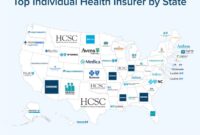Group health insurance enrollment takes center stage in the corporate world, offering employees a vital benefit that ensures their well-being. From understanding different plan types to navigating the enrollment process, this comprehensive guide delves into all aspects of group health insurance, empowering you to make informed decisions for your workforce.
Overview of Group Health Insurance Enrollment

Group health insurance is a type of health insurance coverage that is provided by an employer to its employees. It allows a group of individuals, typically employees of a company, to be covered under a single policy.
When it comes to group health insurance , it offers numerous advantages such as cost savings and broader coverage. Employers often provide this benefit to their employees, promoting a healthier workforce and higher job satisfaction.
Importance of Offering Group Health Insurance to Employees
Offering group health insurance to employees is crucial for several reasons. Firstly, it helps attract and retain top talent by providing a valuable benefit that can improve employee satisfaction and loyalty. Additionally, group health insurance can contribute to a healthier workforce, reducing absenteeism and increasing productivity.
For those who are self-employed, health insurance for self-employed individuals is essential. It ensures access to quality healthcare services without relying on employer-sponsored plans, providing peace of mind and financial security.
Statistics on Companies Providing Group Health Insurance
- According to the Kaiser Family Foundation, around 56% of employers in the United States offer health insurance coverage to their employees.
- Small businesses with fewer than 50 employees are less likely to provide group health insurance compared to larger companies.
Benefits Included in Group Health Insurance Plans
- Medical coverage for doctor visits, hospital stays, and prescription drugs.
- Mental health services and substance abuse treatment.
- Preventive care services such as vaccinations and screenings.
- Dental and vision coverage options.
- Wellness programs and resources to promote healthy lifestyles.
Types of Group Health Insurance Plans

Group health insurance plans offer various options to cater to the needs of different organizations and their employees. Understanding the differences between these plans is essential for making informed decisions when choosing the right coverage.
HMO, PPO, and POS Plans
Health Maintenance Organization (HMO), Preferred Provider Organization (PPO), and Point of Service (POS) plans are common types of group health insurance plans. Here is a brief comparison of these plans:
- HMO: HMO plans require members to choose a primary care physician (PCP) and get referrals to see specialists. They typically have lower out-of-pocket costs but restrict coverage to in-network providers.
- PPO: PPO plans offer more flexibility in choosing healthcare providers. Members can see specialists without referrals, but they pay more for out-of-network care. PPO plans usually have higher premiums compared to HMOs.
- POS: POS plans combine elements of HMO and PPO plans. Members choose a PCP and need referrals for specialists, but they can also seek care outside the network at a higher cost.
Fully-Insured vs. Self-Insured Plans
When it comes to group health insurance, organizations can opt for fully-insured or self-insured plans:
- Fully-Insured: In a fully-insured plan, the employer pays a premium to an insurance company, which assumes the financial risk for providing healthcare coverage to employees. The premium is fixed, and the insurance company covers all claims and administrative costs.
- Self-Insured: With a self-insured plan, the employer takes on the financial risk for providing healthcare benefits. The employer pays claims as they occur, and stop-loss insurance may be purchased to protect against high claim costs.
High-Deductible Health Plan (HDHP)
A high-deductible health plan (HDHP) is a type of group health insurance plan with a higher deductible than traditional plans. HDHPs are often paired with Health Savings Accounts (HSAs) or Health Reimbursement Arrangements (HRAs) to help employees cover out-of-pocket costs. These plans typically have lower premiums but higher out-of-pocket expenses.
Group vs. Individual Health Insurance Plans
Group health insurance plans are provided by employers to cover a group of employees, while individual health insurance plans are purchased by individuals to cover themselves and their families. Group plans often offer lower premiums, better coverage, and may include additional benefits compared to individual plans. Additionally, group plans are subject to different regulations and eligibility criteria than individual plans.
Enrollment Process for Group Health Insurance: Group Health Insurance Enrollment
When it comes to enrolling in a group health insurance plan, there are specific steps that employees need to follow. Understanding the enrollment process is crucial to ensure that employees get the coverage they need for themselves and their families.
Eligibility Criteria for Employees
In order to enroll in a company’s group health insurance plan, employees typically need to meet certain eligibility criteria. This can include factors such as being a full-time employee, having a certain length of service with the company, or any other requirements set by the employer.
- Employees must be full-time: Many companies require employees to work a minimum number of hours per week to be eligible for group health insurance.
- Length of service: Some employers may have a waiting period before new employees can enroll in the group health insurance plan.
- Other eligibility requirements: Employers may have additional criteria such as being a permanent employee or meeting certain performance standards.
Role of HR Department
The HR department plays a crucial role in facilitating group health insurance enrollment for employees. They are responsible for providing information about the available plans, assisting employees with the enrollment process, and addressing any questions or concerns that may arise.
- Communicating plan details: HR educates employees about the different health insurance options available and helps them understand their coverage.
- Enrollment assistance: HR guides employees through the enrollment process, ensuring that all necessary paperwork is completed accurately and on time.
- Handling inquiries: HR serves as a point of contact for employees who have questions or need clarification about the group health insurance plans.
Tips for Selecting the Right Coverage
During the enrollment period, employees have the opportunity to select the right coverage that suits their needs. It is important for employees to carefully consider their options and choose a plan that provides adequate coverage for themselves and their dependents.
- Assess your needs: Consider your current health status, any ongoing medical treatments, and the needs of your family members when choosing a plan.
- Compare plan options: Review the different plans available, including the coverage, premiums, deductibles, and out-of-pocket costs to determine which plan best fits your requirements.
- Utilize resources: Take advantage of tools provided by HR, such as plan comparison charts or online calculators, to help you make an informed decision.
Compliance and Regulations in Group Health Insurance Enrollment

When it comes to offering group health insurance, companies must adhere to various legal requirements and regulations to ensure compliance and protect the rights of employees. Understanding these rules is essential for both employers and employees to navigate the enrollment process smoothly.
Affordable Care Act Impact
The Affordable Care Act (ACA) has had a significant impact on group health insurance enrollment. Under the ACA, employers with 50 or more full-time employees are required to offer affordable health insurance that meets certain minimum standards. This law aims to expand access to healthcare coverage and ensure that employees have access to essential health benefits.
COBRA Laws
COBRA laws give employees the right to continue their group health insurance coverage after leaving a job, being laid off, or experiencing other qualifying events. This allows individuals to maintain their health insurance for a limited period, although they may need to pay the full premium cost themselves. Understanding COBRA laws is crucial for employees transitioning between jobs or facing unexpected job loss.
HIPAA Regulations, Group health insurance enrollment
HIPAA regulations play a key role in protecting the privacy and security of individuals’ health information. In the context of group health insurance enrollment, HIPAA ensures that employees’ personal health information is safeguarded and not used inappropriately. Employers must comply with HIPAA regulations to maintain the confidentiality of employees’ health data and prevent unauthorized access or disclosure.
In conclusion, group health insurance enrollment is a critical component of any company’s benefits package, promoting employee satisfaction and retention. By staying informed about compliance regulations and plan options, employers can create a healthy and supportive work environment for their staff.
Understanding the family health insurance benefits is crucial for protecting your loved ones’ well-being. It offers comprehensive coverage for medical expenses, preventive care, and emergencies, ensuring your family’s health and happiness.



